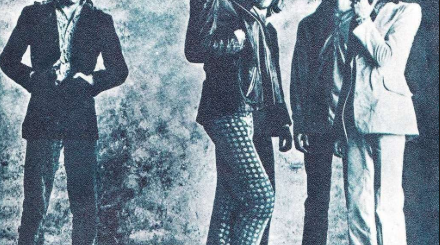68 Street Fighting Man by The Rolling Stones Lyrics Meaning – Decoding the Anthem of Rebellion
Lyrics
Of marching charging feet, boy
‘Cause summer’s here and the time is right
For fighting in the street, boy
Well now, what can a poor boy do
Except to sing for a rock n’ roll band?
‘Cause in sleepy London town
There’s just no place for a street fighting man, no
Hey think the time is right
For a palace revolution
But where I live the game
To play is compromise solution
Well now, what can a poor boy do
Except to sing for a rock n’ roll band?
‘Cause in sleepy London town
There’s just no place for a street fighting man, no. Get down.
Hey so my name is called Disturbance
I’ll shout and scream
I’ll kill the king, I’ll rail at all his servants
Well, what can a poor boy do
Except to sing for a rock n’ roll band?
‘Cause in sleepy London town
There’s just no place for a street fighting man, no
Get down
Like a molotov cocktail thrown into the heart of a politically tumultuous era, The Rolling Stones’ ‘Street Fighting Man’ captured the restless spirit of 1968. Driven by Keith Richards’ resonant opening riff and Mick Jagger’s stirring vocals, the song became an anthem for a generation poised on the brink of revolution.
Below the song’s deceptively simple surface lies a mosaic of meanings and interpretations. It’s a profound commentary on the zeitgeist of the 60s, encapsulating the pent-up frustrations and yearnings for change that characterized the times. Let’s dive deep into the social and personal undercurrents that make ‘Street Fighting Man’ a timeless classic.
The Siren Call of Rebellion: A Sonic Revolution
From the jangling tambourine to the gritty strumming of a sitar, ‘Street Fighting Man’ is as musically rebellious as its lyrics. The song’s production broke new ground with its innovative use of recording techniques, embodying the experimental energy of the 1960s. It wasn’t just a track; it was a clarion call to the disaffected youth, urging them to wake from their lethargy.
Musically, ‘Street Fighting Man’ stands out for the way it melds traditional rock elements with an international flair—reflecting the Stones’ absorption of diverse influences, much like the cultural melting pot of London itself. ‘Ev’rywhere I hear the sound of marching charging feet, boy’ — with that line, we’re immediately thrust into the thick of action, amidst protests and youth-led movements that would define an era.
A Poor Boy’s Power: The Microcosm of a Rock ‘n’ Roll Band
‘Well now, what can a poor boy do, Except to sing for a rock n’ roll band?’ Amidst the societal upheavals and class struggles, the song poses a poignant question about the role of an artist. For Mick Jagger and Keith Richards, both from modest backgrounds, rock n’ roll was their way of punching up, their chance at momentum in a society rigid with class structures.
In the song, the ‘poor boy’ becomes an avatar for youthful discontent and aspiration. The notion that making music could be an act of defiance as potent as any physical demonstration was a radical one. It framed rock music not just as entertainment, but as a legitimate forum for protest—in many ways, foreseeing its evolving role in the political conversations of the future.
The Hidden Meaning: Sleepy London and the Quiet Before the Storm
The reference to ‘sleepy London town’ belies a sense of simmering tensions about to boil over. It reflects the Stones’ observation of a city – and a world – that seemed calm on the surface yet was seething with the need for change underneath. The band recognized that beneath this placidity, there was an undercurrent of dissatisfaction among the British youth.
This metaphor of sleepiness versus the activeness of a street fighting man serves as a potent reminder: change often emerges from places least expected. The song, then, isn’t just about the fights on the streets; it’s about the internal battles being waged within individuals craving transformation, challenging the listener to consider their own state of contentment or agitation.
A Palace Revolution: The Satirical Sting in Jagger’s Tale
‘Hey think the time is right for a palace revolution, But where I live the game to play is compromise solution.’ With these lines, The Rolling Stones offer a caustic critique of the political structures of the day. The song acknowledges the desire for revolution yet juxtaposes it with the often frustrating reality of incremental change.
The irony isn’t lost on the listeners—the Stones are acutely aware that revolutions can be romanticized but gaining ground in reality often requires negotiation and compromise. It’s an astute observation on the often-cynical nature of politics, wrapped in the fervor of revolutionary zeal, yet tempered by an understanding of the world’s complexities.
Memorable Lines: The Outcry of a Generation
Perhaps one of the most enduring lines from ‘Street Fighting Man’ is the persona Jagger adopts: ‘Hey so my name is called Disturbance’. The name ‘Disturbance’ becomes symbolic of the entire counterculture movement, of every individual standing up against the status quo, and of the collective voice that refuses to be silenced.
‘I’ll shout and scream, I’ll kill the king, I’ll rail at all his servants’ — this line is not calling for literal regicide but symbolizes overthrowing the established order. It reflects the Stones’ understanding of the power of words and music as weapons in the arsenal of the young, impassioned with the idea of tearing down old systems to make way for the new.








